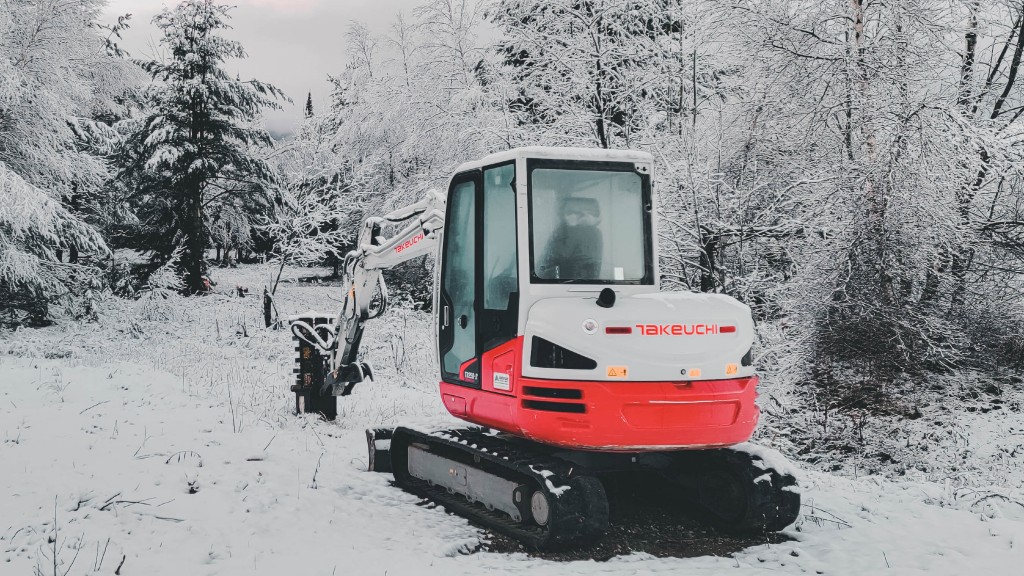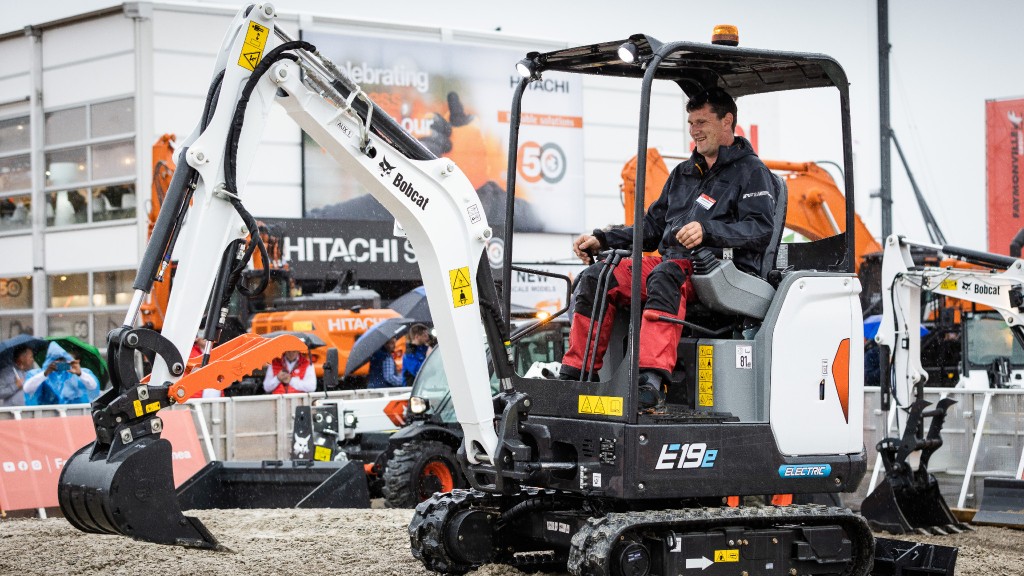
Whether it is teeth-chattering cold or sweltering heat, working conditions can greatly impact a compact excavator's performance and longevity. It is important to be prepared by both understanding your environmental challenges and following the operator's manual guidelines.
How to maintain a compact excavator in freezing temperatures
What are the right fluids for a compact excavator in winter?
Many operators capitalize on their compact excavator investments by using their machines all year round. To ensure your machine runs reliably throughout the coldest months, it's important to take basic maintenance measures. First, ensure you're using the right fluids for the anticipated temperatures and conditions.
"In cold climates where the temperature gets close to or below freezing, the first step is using engine oil, coolant, and diesel fuel that are suited for cold weather operation," said David Caldwell, national product manager for Takeuchi-US. "The engine oil should be the correct viscosity for the expected ambient temperature as outlined in the machine operator's manual. Also, check the engine coolant mixture to ensure the mixture is adequate. Using #1 diesel fuel or a winter blend helps prevent the fuel from gelling in extreme cold."
When should you drain water out of the fuel/water separator of a compact excavator?
In all climates, compact excavator operators should drain the water out of the fuel/water separator daily to prevent damage to the high-pressure fuel system and engine. However, this is even more critical during the winter, because in cold conditions, excess water in the fuel can freeze in the lines. This causes the engine to stall or starve for fuel.
"If this situation is allowed to continue, it can damage the machine's fuel system, creating a costly fix," Caldwell said. "We recommend draining the water once per month from the fuel tank as well."
When should you check if a compact excavator's hydraulic maintenance is up to date?
After ensuring the compact excavator's engine is protected, operators should check to see that the hydraulic system's maintenance is up to date. Whether service is due or not, it is good practice to regularly inspect the hydraulic oil because its condition is just as important as its level.
"If the oil is dark, looks burnt, or is any abnormal color, replace it," Caldwell said. "As oil ages and is exposed to high temperatures, its viscosity decreases, providing less protection of vital hydraulic components. Drain the oil immediately if it appears ‘milky,' which is a sign of water in the oil. This can cause serious damage to the hydraulic system."
Common mistakes made when operating a compact excavator in winter
In addition to following the instructions above, operators using their equipment throughout the winter can reduce costly downtime by avoiding a few common mistakes.
Mistake #1: Leaving material in the undercarriage
Material left in the undercarriage between the rollers, carriers, and tracks can freeze overnight, preventing the rollers and carriers from properly spinning when the operator goes to use the machine the next morning. The roller can also develop flat spots, so it's imperative to clean out the excavator's tracks daily.
Mistake #2: Leaving the excavator on damp ground outdoors in freezing temperatures
Parking your excavator outdoors in freezing temperatures overnight may cause its tracks to freeze to the ground. Debris can also freeze to the cylinder rods, which can damage the wiper seals on the cylinders. Be sure to park the machine in a dry area and clean any exposed portion of the cylinder rods.
Mistake #3: Increasing RPM too quickly
Increasing the RPM too quickly in cold climates can cause engine damage. This is due to the lack of oil pressure to certain components such as the turbocharger. The machine should idle at startup so the oil can circulate and get to the proper operating temperature.
"Let the engine idle for five minutes or so," Caldwell explained. "Then, gradually increase its RPM. Also, ease in working the hydraulics."
Mistake #4: Using ether or starting fluid
Using ether or starting fluid is never recommended. If an operator believes starting fluid is necessary, something is likely wrong with the engine, or the block heater should've been used. This fluid causes a rapid increase in compression and can cause the piston to crack or melt, among other failures. A block heater will keep the coolant warm and helps the engine start much easier the next morning.
"Install a block heater and plug the equipment in overnight," Caldwell said. "Glow plugs or a grid heater are also great functions to use throughout the winter if so equipped."
How to maintain a compact excavator in summer heat
While winter's frigid conditions are tough on a compact excavator, summer's heat is also unforgiving and can be deadly to machines on the job. Summer is a busy time for construction, and the last thing anyone needs is a machine breaking down. To ensure you have uptime instead of costly downtime, it's best to create a proactive plan.
Compact excavator startup checklist for summer
First, it is a good habit to keep the excavator clean, keep its services up to date and correctly grease it. Also, always check for the following conditions before starting the machine:
- All fluids are up to the correct levels.
- Coolant is mixed correctly for the current operating environment and temperature.
- The radiator is clean and free flowing.
- Fan and fan drive belt are adjusted correctly.
- Air flow passages are clean so the machine can exchange the hot air in the engine compartment with cool air from the outside. The loader tower needs to be free of debris. Without proper air flow, the engine compartment can turn into a hot box, trapping the heat.
What to do when a compact excavator becomes overheated
"When the temperature spikes, an excavator's components naturally work harder and can wear out quickly," Caldwell said. "With this in mind, it is good to pay close attention to your machine's display to ensure it is operating at optimum capacity, especially as the day continues."
If you do find that your machine is stressed due to the heat, try to find some shade to help it cool down faster. A stressed unit can be dangerous for the operator and anyone around the machine. Let the machine idle before completely shutting down.
"Compact excavators equipped with telematics like our Takeuchi Fleet Management system make it easy to check the engine temperature and catch any irregularities before anything too serious happens," Caldwell added. "Telematics are truly worth the extra investment for all these reasons and more."
Compact excavators can take on harsh conditions with the right care
When working with a well-built machine, it is not unusual to take on an indestructible mentality – the idea that, sure we can move that giant rock or climb straight up the side of a steep embankment. It's imperative to understand an excavator's purpose and limitations while taking special precautions for extreme operating conditions. Remember, a compact excavator is like a tank with a bucket. If maintained correctly with regular servicing and greasing, it will hold up in extremely harsh conditions.
"Extreme temperatures are tough on machines," Caldwell said. "Protect your biggest assets with a little preventative maintenance. Your bottom line will thank you in the long run."



